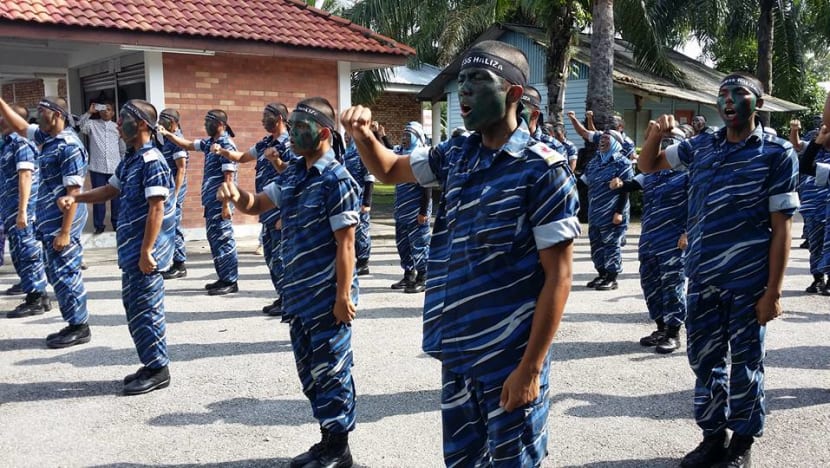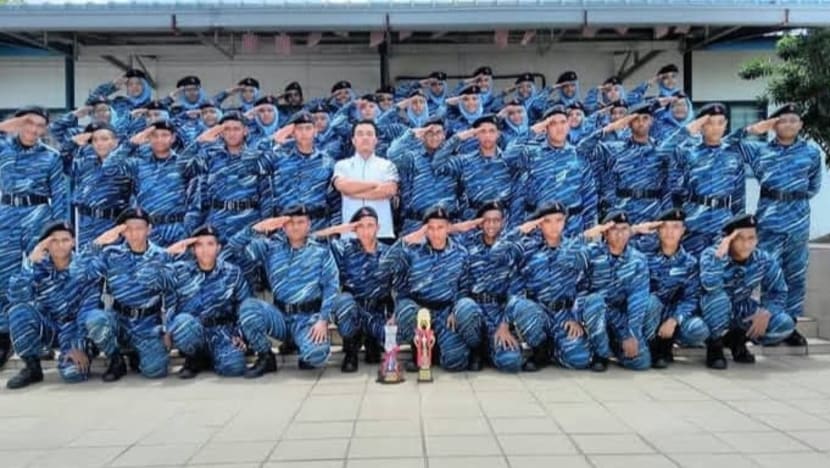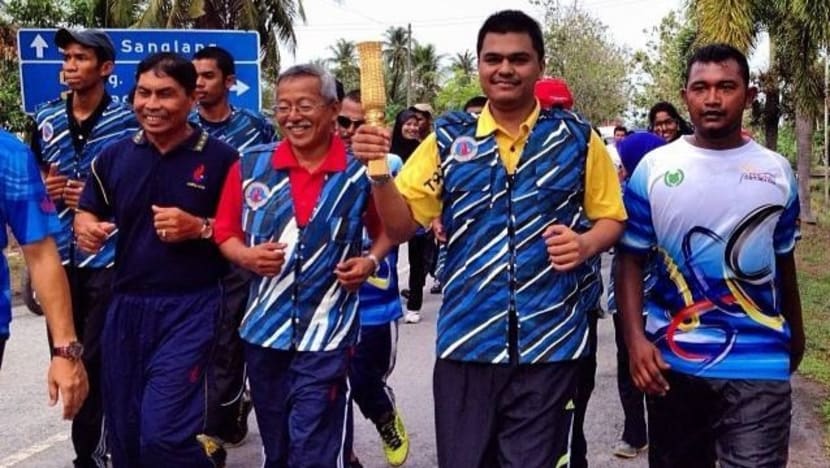As Malaysia restarts national service programme, can it avoid its 'on-again, off-again' history?
The third iteration of the National Service Training Programme - dubbed PLKN 3.0 - will be back via a pilot project from Jan 12 involving 200 school leavers who had applied for the programme voluntarily.

Trainees at a Malaysian national service programme back in 2015. (Photo: Facebook/Kementerian Pertahanan Malaysia)

This audio is generated by an AI tool.
KUALA LUMPUR: Almost two decades ago, when Sue Haizal received the call-up to serve in Malaysia’s national service, the now 38-year-old housewife recalled being terrified as she was about to venture into the unknown.
She had heard of countless “horror stories” about the programme from her friends, and was worried that she would have a negative experience as well.
"I didn't want to go. I was terrified of ragging and was worried I wouldn't be able to endure it,” said Sue, who is from Muar in the southern state of Johor.
But the time she served in national service proved to be the opposite, she told CNA, believing it to be a “transformative experience” that fostered her personal growth.
“I did many things that I wouldn’t have done if I hadn’t gone there,” Sue said.
For the first half of her training, she was based at a camp in Endau - located in Johor’s Mersing district - before being placed at the Universiti Teknologi Malaysia (UTM) for the remaining one-and-a-half months.
“I was an introvert and didn’t have much confidence, but I believe this improved after the national service,” she said.
Malaysia’s national service programme was first introduced in 2004, with those aged 18 and above selected randomly for a compulsory three-month training to instill the spirit of patriotism, resilience and volunteerism in the trainees.
It was then halted in 2015 due to cost cutting measures and reintroduced the following year with participation to be made optional by 2019.

But the programme was scrapped by the Pakatan Harapan government in August 2018, three months after it came to power, with the then youth and sports minister Syed Saddiq Syed Abdul Rahman saying it had been misused for the purpose of the indoctrination of certain beliefs.
Now, the third iteration of the National Service Training Programme - dubbed PLKN 3.0 - will be back via a pilot project involving 200 people aged between 18 and 20 who applied for the programme voluntarily.
Beginning from Sunday (Jan 12), the programme will be held at a territorial army camp in Kuala Lumpur for a period of 45 days.
It will then be expanded to the next phase with 500 different recruits in July before being fully implemented next year.
While there have been calls by many including a parliamentary special select committee to not go forward with the programme, advocates for PLKN 3.0 say that it is one that fosters patriotism, unity, and discipline among Malaysia’s youths.
IMPLEMENTATION NOT CLEAR
Saifuddin Abdullah - who is the chairman of a parliamentary special select committee on Nation Building, Education and Human Resources Development - told a press conference last month that the government should not proceed with the programme.
But should the authorities go forward with PLKN 3.0, Saifuddin urged for more studies to be conducted as its current implementation strategy was not clear.
“There are no clear objectives because of legacy problems from the previous national service programmes. If it wants to continue, it should be military or semi-military. If we want to do it, it must be properly done.
“Not like how it is suggested today. But if we do the military system, then there will be questions if we really need it. Are we like other countries that need these programmes?” he said.
In the region, Singapore and Thailand have national service programmes that are predominantly military-focused.
In Singapore, the two-year national service is compulsory for every able-bodied male citizen and permanent resident aged 18 and above to serve in the uniformed services.
Meanwhile, in Thailand, males reaching the age of 18 are required to enlist in the military. If they do not volunteer, they become eligible for conscription when they turn 21. They must then participate in a lottery that takes place every April.
Those without a high school diploma must serve for two years, while high school graduates who volunteer are obligated to serve for a year.
Saifuddin said that Malaysia’s module for PLKN 3.0 - 70 per cent military and 30 per cent national education - were similar to the previous iterations of the programme.
He said that even within the military modules, a significant portion of the curriculum lacked a direct military focus, encompassing things such as Technical and Vocational Education and Training (TVET).
“This is also taught in other educational institutes. What is the need to spend money on the same thing? As for national education, it is already taught comprehensively in history (classes) in schools,” he said, claiming that based on multiple studies, the programme did not yield any enduring positive outcomes for its participants.
Saifuddin noted that another factor against holding national service would be its cost, pointing out that the Malaysian government had spent RM500 million (US$111 million) every year on the programme previously.
“The target for the third national service is bigger than the first two. It is possible the actual programme in 2026 will require a bigger budget,” he said.
Other concerns regarding national service revolve around safety issues, including bullying, sexual harassment, and fighting.
Until 2013, there had been 23 reported deaths in the national service.
In the past, the programme has also been marred by incidents of food poisoning and substandard hygienic conditions of training camps, among others.

Educational lobbyist group Parent Action Group for Education chairman Noor Azimah Abdul Rahim questioned if the government had conducted any impact studies on national service.
“Did we achieve what we wanted to? What data do we have to show that you did? And what really is the purpose of it all? During the last two national service programmes, we saw deaths and accidents.
“That is our main concern. How can they ensure these deaths will not happen again? It is unacceptable. If it happens again, who will be accountable? Or will it be swept under the carpet,” she told CNA.
Azimah also highlighted concerns about bullying, citing the recent cases that surfaced in several Malaysian military educational institutions.
“While this is fresh on people’s minds, they are suddenly still insisting on PLKN. What assurances are given to parents?” she asked.
Meanwhile, Mohd Mahadee Ismail of Universiti Putra Malaysia’s faculty of human ecology told CNA that in principle the programme was good for the purposes of nation building and character building, but the implementation was poor.
“The problem is they wanted to include everything from A to Z and lost focus. It should only have been a few core elements,” he said.
Mahadee - who has done research on Malaysia's national service programme - also claimed that the programme started to become a business where camp operators prioritised profit over quality.
He said that in the past, the different camps were not standardised, and some were better than others.
“The element of nation building eroded and it became a place for the cronies of the leaders to get projects. It looked as if they were trying to reduce cost for more profit,” he said, further claiming that some of the trainers appointed were not fully professional.
WHAT IS THE TRAINING PROGRAMME LIKE?
Defence Minister Khaled Noordin said in early December that the first phase of the programme would begin in January, with 148 males and 52 females selected from a pool of 564 applications. They had applied for the programme voluntarily.
While the pilot project would see both males and females at the same venue, subsequent training camps will be segregated according to genders, he said, adding that the average cost borne by the government for each participant daily would be RM64.
He had told The Star in a separate interview that the training programme for PLKN 3.0 will be divided into three phases: Pre-PLKN, basic training, and specialised training.
He said the pre-national training phase would involve Form Four students in programmes that will be implemented during co-curricular activities in schools. Malaysia’s students study until Form Five, with an option of extending studies to Form Six, which is equivalent to pre-university studies.
Meanwhile, the basic phase of training would be for those aged 17 and above at 13 Territorial Army camps, 20 public universities and selected polytechnics nationwide.
Khaled said the basic PLKN 3.0 training component expects to train 25,000 trainees at one time through four intakes of recruitment annually.
He added that the specialised training phase, open to individuals aged 17 to 35, will involve intensive field training and practical components.
Volunteer bodies and reservists who will run this phase include the Auxiliary Police, Auxiliary Fire Brigade, and Civil Defence Force.
Khaled said that to ensure security and prevent possible cases of bullying, 32 wardens will be stationed at the PLKN camp on a 24-hour basis, with closed-circuit televisions installed throughout the venue.
He added that unlike its predecessors, which operated exclusively in private PLKN camps, PLKN 3.0 utilises a diverse range of government-based facilities.
“This shift does not only provide better infrastructure but also creates a more formal and better professional training environment,” he was quoted as saying.
Meanwhile, the chief executive of the Malaysian Institute of Defence and Security (MIDAS) Major-General Ya’cob Samiran has expressed concern regarding the current “unsatisfactory” level of patriotism among youth, saying that the programme would be able to foster a greater sense of national pride.
MIDAS is in charge of implementing the PLKN 3.0.
“The national service is not to make the attendees into soldiers but for them to undergo a regimented life. They will have to wake up early and do things. They will be more punctual and have a more organised life where they are. It is a unique experience that they won’t be able to get anywhere else,” he said in an interview with the communications ministry on Dec 11.
While the eligibility criteria for national service encompass individuals aged 16 to 35, Ya’cob said that the basic programme would be implemented exclusively for those within the age bracket of 17 to 20.
Separately, Dewan Rakyat Speaker Johari Abdul said on Jan 9 that a survey by MIDAS found that 87 per cent of the 3,092 respondents who were aged between 16 and 60 agreed that the programme should be extended.
He was quoted by Bernama as saying that the survey included parents who wanted their children to have a clear direction in life.
FOSTERS PATRIOTISM AND UNDERSTANDING
Mohd Syafik Mohd Taufik - who is an alumnus from the first batch of national service trainees in 2004 - believes that the revamped programme would be able to help quell the lingering racial tensions in the country.
“From my experience in the national service, participants mix with one another. In school, they go back to their families but in the national service, their families are the other participants, all of whom are of different backgrounds. From there you build an understanding of one another,” said Syafik, who is from Negeri Sembilan.
He, however, said that the scope of the national service became too wide as there were elements such as TVET and even information technology included in its modules.
“You would lose focus after a while and it should really be kept simple to the core elements of unity and nation building,” he said.
While Syafik told CNA that he is not against a “military-style” national service, he believes that PLKN 3.0 should focus on the basics of unity and patriotism as Malaysia is not currently engaged in armed conflict.
“The national service should go back to the basics of how the country was formed. The patriotism will be inculcated in the trainees I believe,” he said.
He also hoped for more participation from more school leavers, pointing out that every year, there are about 400,000 students who take their Sijil Pelajaran Malaysia (SPM) examinations. SPM is a national examination taken by Form 5 secondary school students in the country before further studies.

Meanwhile, the housewife Sue recalled that she was exposed to survival training in the forest as well as activities such as marching and kayaking at the Endau camp.
The latter phase of her training in UTM saw her getting exposed to classes that taught her about teamwork and self-discipline, among others.
She also got the chance to live with a family at the Felda Taib Andak settlement in Johor and to volunteer at an old folks’ home.
From her experience, the people in the camp sat as one despite their differences in culture and wealth disparities.
“Rich or poor, there was no difference between anyone,” she said.
Former national service trainer Ahmad Fakhrulah Shari, who served at seven PLKN camps throughout the country between 2006 and 2018, echoed similar sentiments.
“There are trainees who had never spoken to people of other races before but they made friends with people of other races and opened up their minds,” said Ahmad, who is now working in the civil service.
He recalled that there were some trainees who did not know who the rulers or leaders of the country were.
“At least they learned a bit about the country before leaving. I also learned about some things myself,” he said, adding that the training in place helps to forge a stronger mentality among the trainees.
As for concerns on bullying and other issues, Ahmad said that these happened everywhere including in schools, universities and workplaces.
“Of course we don’t want these things to happen, but they can occur anywhere. Maybe there is a need to increase the number of trainers at the camps,” said Ahmad, who is from Kelantan.
MORE CONTINUITY NEEDED
Ahmad also expressed hope for the programme’s continued implementation, rather than the on-again, off-again approach witnessed in the past.
“How are you going to improve it if there is no continuity,’ he said.
Syafik, meanwhile, believes that the opinion that the national service was a waste of money came from members of the public who did not see the collective benefit of the programme after it had ended.
“I believe that Malaysians want to see the outcome once the training is over. What happens next? There should be a platform where the trainees can help out during a natural disaster such as floods for instance.
“After our training is over there is no follow-up and no structure to it. That’s why people say it is a waste of money,” he said.
Sue - who is now a mother of three - welcomes the reintroduction of Malaysia’s national service, saying that she would not complain if her children were picked for it in the future.
“It wasn’t as bad as some made it out to be. In fact, it was the opposite,” she said.


















